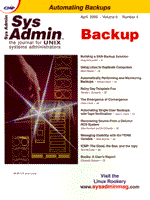Listing 2 rcs_recover.ss
#!/bin/ksh
# this script uses either Bourne or Korn shell.
#
# Listing 2:
# Title: rcs_recover.ss
# Subject: RCS head branch retrieval script.
# Author: Mike Dunham
# Date: 12/02/1999
# Description:
# Retrieve the head branch of code from a former RCS
# file. Intended for quick use when retrieving data from
# old RCS archives without the time consuming step of configuring
# the RCS archive directories and environments.
# retrieve list of file names is passed to the shell script.
file_list=$*
# create a sub directory for the output of the head branch source
# with the original file name under the current working directory.
output_dir=./tst
# Define the awk command. this may be nawk, gawk, etc
awk_cmd=awk
# Setup a var for the awk script to get the header revision number.
awk_header=$output_dir/header.awk.$$
# Setup a var for the awk script to get the source code
awk_version=$output_dir/version.awk.$$
# Create output directory if it doesn't exist and make it writable
if [ ! -d $output_dir ]
then
mkdir $output_dir
chmod 755 $output_dir
fi
# Build an awk script using the shell's here facility to strip the
# header version from the RCS file. Add the process id to the end
# of file to make sure the name is unique.
cat <<EOF >$awk_header
/^head/ {
version=\$2;
semi=index(version,";");
final=substr(version,1,(semi-1));
printf "%s", final;
}
EOF
# loop through the files in the list
for work_file in $file_list
do
# Get the header version from the file with the awk command
header_version='$awk_cmd -f $awk_header $work_file'
# If there was no header information, we may not have an RCS
# file, so inform the user and terminate
if [ ! $header_version ]
then
echo "Unable to find the RCS HEAD block in file $work_file"
echo "Can not continue!"
exit 1
fi
# build another awk script to capture the source code for the
# header reversion
cat <<EOF >$awk_version
BEGIN {
first_line_flg=0;
text_line_flg=0;
first_at_flg=0;
last_at_flg=0;
}
/^${header_version}/ {
if (first_line_flg==0) {
first_line_flg=1;
}
}
/^text/ {
if (first_line_flg==1 && text_line_flg==0) {
text_line_flg=1;
}
}
/^@/ {
if (first_at_flg==0) {
if (first_line_flg==1 && text_line_flg==1) {
first_at_flg=1;
tmp_str=substr(\$0,2);
printf("%s\n",tmp_str);
getline;
}
}
else {
if (first_line_flg==1 && text_line_flg==1) {
last_at_flg=1;
}
}
}
{
if (first_line_flg==1 && text_line_flg==1 && \
first_at_flg==1 && last_at_flg==0)
print \$0;
}
EOF
# Name of our work directory and output file
output_file=$output_dir/$work_file.tmp
# Execute AWK script and redirect to output file
$awk_cmd -f $awk_version $work_file >$output_file
# Strip out any double @ signs and tack .src on just to prevent
# overwriting of the original files if an error condition occurs.
sed -e '/\@\@/s/\@\@/\@/g' \
$output_file >$output_dir/$work_file.src
# Cleanup temp work file from AWK/SED step
rm $output_file
done
# remove temporary files
rm -f $awk_header $awk_version
exit 0
|
